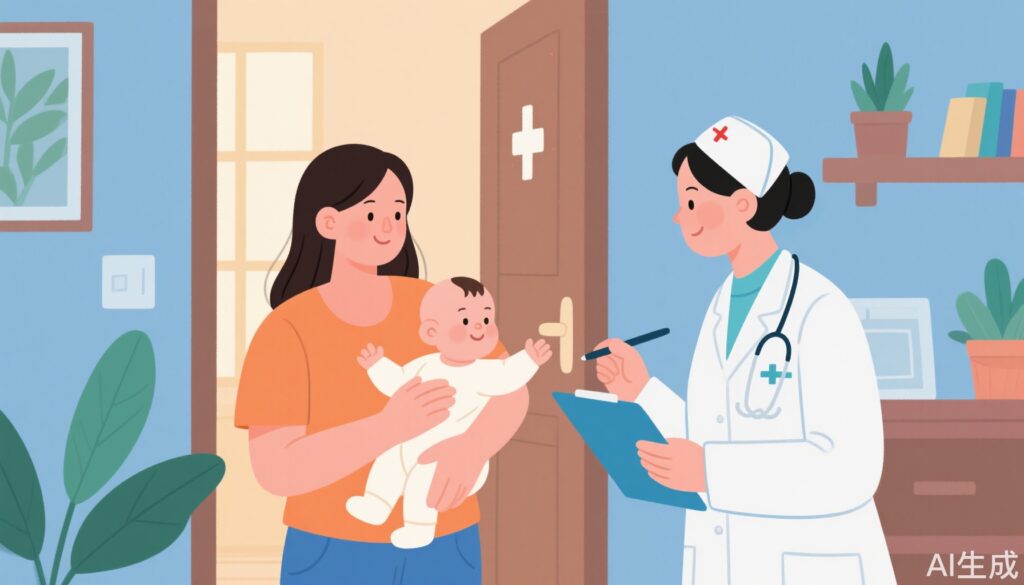Introduction
Early childhood adversity can have lasting effects on health and development. To address this, home visiting programs like the Nurse-Family Partnership (NFP) have been developed to provide support to young, low-income families during pregnancy and early childhood. These programs aim to reduce risks of adverse health outcomes by offering guidance and resources directly in the home environment. However, evidence on their effectiveness when implemented at scale remains limited.
Study Objective
This study sought to evaluate how receiving home visits through the NFP program impacted children’s healthcare utilization and health outcomes during the first two years of life. The focus was on Medicaid-eligible pregnant individuals and subsequent child health metrics.
Methods
The study was a randomized clinical trial conducted in South Carolina between 2016 and 2020. A total of 5,670 Medicaid-eligible pregnant individuals, less than 28 weeks pregnant with their first child and aged 15 or older, were randomly assigned in a 2:1 ratio to either receive NFP home visits (n=3,806) or usual care (n=1,864). The trial spanned nine authorities implementing the NFP program.
The intervention group received intensive home visits by nurses during pregnancy and up to two years postpartum, while the control group continued with usual healthcare services without additional home visits.
Main Outcomes and Measures
The primary outcome was a composite measure encompassing child mortality and claims related to major injury or concerns about abuse or neglect during the first two years. Secondary outcomes included emergency department (ED) utilization and preventive healthcare measures such as well-child visits and specific screenings (cognitive development, blood lead levels), fluoride varnish application, and dental health assessments.
An intent-to-treat analysis using linear regression compared outcomes between the treatment and control groups regardless of actual receipt of NFP services.
Results
Out of the enrolled participants, 4,932 were followed through to a live birth (3,295 intervention, 1,637 control), and their children were followed until age two. The average maternal age was 22.5 years.
The incidence of the composite adverse outcome was 27.3% in the intervention group and 26.8% in the control group, showing no statistically significant difference (adjusted difference 0.4 percentage points; 95% CI, -2.3 to 3.0). Each element of the composite outcome similarly showed no significant differences.
Children in the NFP group were 2.9 percentage points less likely to visit the emergency department (95% CI, -5.5 to -0.3), representing a 4% relative reduction compared to the 72.8% rate in controls. However, after adjustment for multiple comparisons, this result was not statistically significant.
There was also no significant impact of NFP on the likelihood of receiving the recommended number of well-child visits or preventive services.
Discussion
This trial indicates that intensive nurse home visiting through NFP did not significantly reduce adverse health outcomes in early childhood as measured by administrative data. The slight reduction in emergency department visits suggests some potential benefit, but this was not robust after statistical adjustment.
These findings highlight the challenges of translating home visiting programs into measurable improvements in health outcomes at scale for Medicaid populations. It remains important to explore whether intensive home visiting might influence other aspects of child development or longer-term outcomes not captured in this study.
Conclusion
In summary, the randomized clinical trial found that assignment to intensive nurse home visiting via the Nurse-Family Partnership did not substantially reduce adverse early childhood outcomes or increase preventive healthcare engagement within the first two years of life. Further research is needed to evaluate its impact on broader developmental outcomes and to optimize delivery strategies for home visiting programs.
Trial Registration
ClinicalTrials.gov Identifier: NCT03360539
Reference
Swanson K, Ayers S, Oviedo D, Zhou RA, Bates MA, Baicker K, Chien AT, McConnell M. Intensive Nurse Home Visiting and Early Childhood Outcomes: A Randomized Clinical Trial. JAMA Pediatr. 2025 Aug 1;179(8):857-866. doi: 10.1001/jamapediatrics.2025.1600 IF: 18.0 Q1 . PMID: 40522648 IF: 18.0 Q1 ; PMCID: PMC12171961 IF: 18.0 Q1 .



